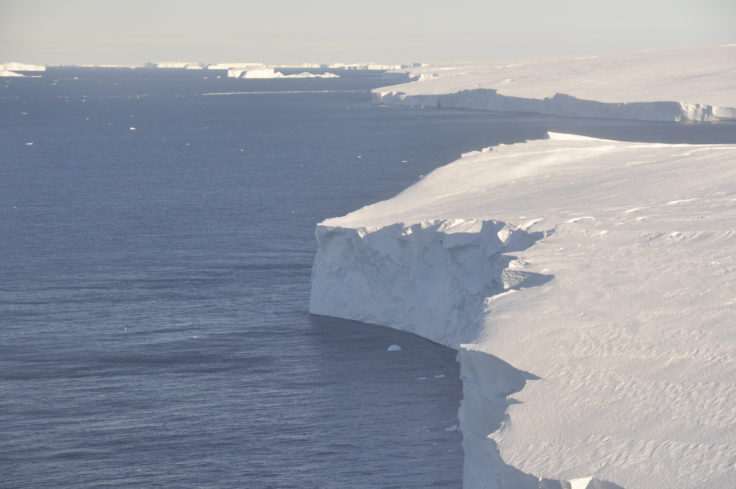According to a new study, titled Widespread increase in dynamic imbalance in the Getz region of Antarctica from 1994 to 2018, published in the journal Nature Communications, glaciers in West Antarctica are moving more quickly from land into the ocean, contributing to rising global sea levels. A 25-year record of satellite observations was used to show widespread increases in ice speed across the Getz sector for the first time, with some ice accelerating into the ocean by nearly 50%.
The study reports that 14 glaciers in the Getz region are thinning and flowing more quickly. Between 1994 and 2018, 315 gigatons of ice was lost, adding 0.9mm to global mean sea level – equivalent to 126 million Olympic swimming pools of water.
The results show that, on average, the speed of all 14 glaciers has increased by almost a quarter, with three glaciers speeding up by over 44%. The study’s authors note that this research will help scientists determine whether glaciers in the region may collapse in the next few decades and how this could affect the rise in global sea levels in the future.
Heather Selley, lead author of the study and a glaciologist at the Centre for Polar Observation and Modelling at the University of Leeds, said, “The Getz region of Antarctica is so remote that humans have never set foot on most of this part of the continent. Satellite radar altimetry records have shown substantial thinning of the ice sheet. However, the high rates of increased glacier speed – coupled with ice thinning – now confirm the Getz basin is in ‘dynamic imbalance’, meaning that it is losing more ice than it gains through snowfall.
“Using a combination of observations and modeling, we show highly localized patterns of acceleration. For instance, we observe the greatest change in the central region of Getz, with one glacier flowing 391m/year faster in 2018 than in 1994. This is a substantial change as it is now flowing at a rate of 669m/year, a 59% increase in just two and a half decades.”
The research, funded by the Natural Environment Research Council (NERC) and the European Space Agency (ESA), also shows how the widely reported thinning and acceleration observed in the neighboring Amundsen Sea glaciers now extends over 1,000km along the West Antarctic coastline into Getz.
Dr Anna Hogg, study co-author and climate researcher in the University of Leeds School of Earth and Environment, added, “The pattern of glacier acceleration shows the highly localized response to ocean dynamics. High-resolution satellite observations from satellites such as ESA’s Sentinel-1, which collects a new image every six days, mean we can measure localized speed changes with ever greater detail.
“Consistent and extensive sampling of both ice speed and ocean temperature are needed to further our understanding of the dynamic ice loss, which now accounts for 98.8% of Antarctica’s sea level contribution.”
By examining 25 years of ocean measurements, the research team was able to show complex and annual variations in ocean temperatures. These results suggest that the dynamic imbalance is mainly caused by longer-term ocean forcing, where increased heat content in the ocean is interacting with the ice and enhancing melt.
Pierre Dutrieux, study co-author and climate researcher at British Antarctic Survey, concluded, “We know that warmer ocean waters are eroding many of West Antarctica’s glaciers, and these new observations demonstrate the impact this is having on the Getz region. This new data will provide a new perspective on the processes taking place, so we can predict future change with more certainty.”
The research team was led by the University of Leeds and included members from Swansea University, Columbia University, British Antarctic Survey, ENVEO IT GmbH, the Remote Sensing Technology Institute in Germany, the University of Denmark, University College London and the Korea Polar Research Institute.



